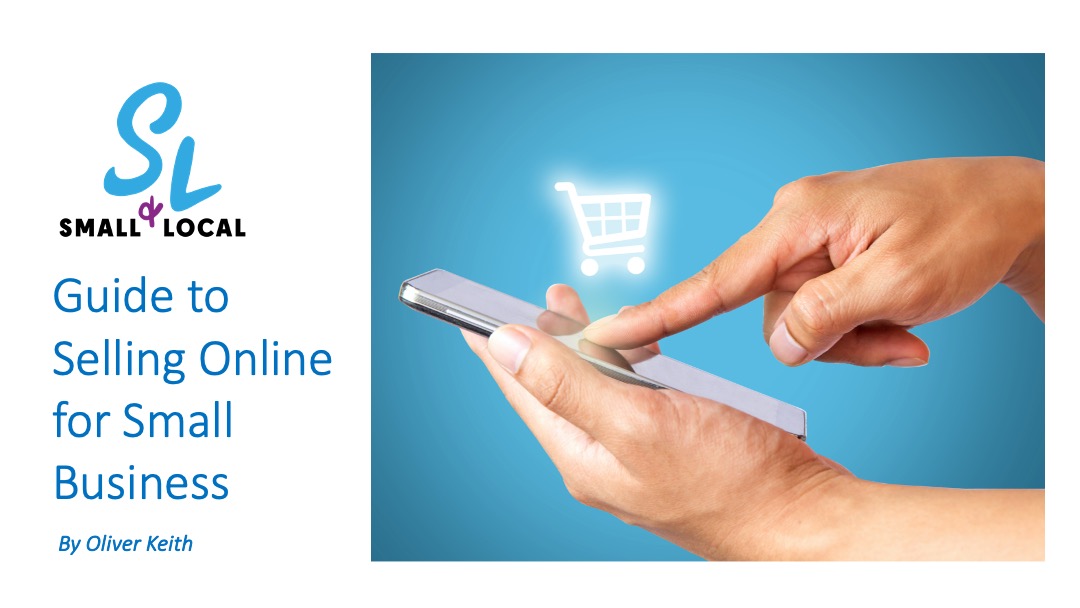Selling online presents a seemingly endless world of options—from Amazon, Etsy, Kijiji, Facebook Marketplace, Facebook shops, websites, Instagram shops, TikTok stores and more. And those are just the ones off the top of my head. Given all the options, it can get hard to figure out which ones are best for what. Where should I be selling my product? Online Store on my website? Facebook Marketplace? What is optimal for showcasing my stuff?
Fear not. We’re here to help! We’ll lay out what platforms do what, and the potential benefits of each for local small businesses by examining three broad online selling categories.
First, online stores (websites) bought from third parties or created on your own—like Wix, WordPress, Shopify, or Square. Second, social media stores such as Instagram Shops or TikTok Stores. Lastly, “market-based” platforms such as Facebook Marketplace and Kijiji. And for each of these categories, will be focusing on these five business factors:
- SEO* and Marketing:
- Entrance Requirements
- Payment Systems and Taxes
- Customer Connection
- Other Considerations
*What does SEO mean? SEO is short for search engine optimization, and refers to leveraging a multitude of factors that help make your online presence more findable by search engines, like Google. Ideally, it helps you to be more visible online to prospective customers.
The idea is to help you, as a local business, get a better idea of the different online selling platforms and what each does—so that you can decide which one to leverage to maximize your online selling potential.
Ok, let’s go!
Websites: Online Stores
I know, “websites” is broad. So, what I mean by that is websites that sell your merchandise via platforms such as WordPress, Wix, Shopify, Square, etc, or those you build from scratch yourself. These are collectively often referred to as “online stores.”
SEO and Marketing
Website-based online stores are head and shoulders above all other platforms in terms of SEO. That’s because they are indexed, and therefore findable, by search engines—especially if search engine optimized.
Facebook shops and Kijiki marketplace items are not indexed by search engines and are typically only findable on their platforms. So, while SEO can be a long and complicated process to reach more customers online, having a business website is still optimal—if well maintained—to reach more people. To help in that regard, here’s a link to some helpful SEO tips for your website.
Entrance Requirements and Restraints
Online stores can be expensive. On average, most website providers are around $13 per month with added services adding costs. This can be a barrier for some. Facebook Marketplace is, after all, free. Moreover, creating a website itself can be a confusing and complicated process, making the education piece to this narrative all the more critical. To help look at your options, I have included a comparison table here for some of the more popular online store providers exploring costs and the different services they offer. Note: these prices are taken from October 2022.
| Square Space | Wix | Go Daddy | Weebly | Webflow | WordPress | |
| Price Basic (monthly) | $16 | $15 | $12 | $7 | $14 | $10 |
| Price Premium (monthly) | $27 | $20 | $23 | $15 | $23 | $33 |
| Blog Editor | Yes | Yes | Yes | Yes | No | Yes |
| Auto Shipping Rates | Yes | Yes | No | Yes | Yes | No |
| Auto Tax Rates | No | No | No | Yes | Yes | Yes |
| Mobile App | Yes | Yes | Yes | Yes | Yes | Yes |
| Email Marketing Tool | Yes | Yes | Yes | Yes | No | No |
| SEO Tools | No | Yes | Yes | No | Yes | Yes |
| Social Media Marketing | Yes | Yes | Yes | Yes | No | No |
Payment Systems and taxes

Online stores can provide one key bonus—automation. An online store can allow for real-time purchases including taxes, shipping costs, and delivery, all online. Today, that is critical. Since 2020 and the end of COVID-19 online purchases surpassed 5.2 trillion U.S. dollars worldwide and took up 23% of all global sales. And with the rise of Amazon Prime, that causal need to buy online rather than in-person pushes even local businesses to the e-sphere. But worry not, creating an online shopping presence is doable and can be simple. For help with this, here’s a helpful guide on how to create your local business’ online selling and delivery service.
Customer Connection
Nothing is worse than bad customer service and having a poor website that’s hard to navigate can lead to that. For example, a bad online shopping or checkout experience (or delivery mishap) may lead to long wait times for refunds, re-delivery, or full cancellations. Making sure your website is clean and properly prepared for such problems is critical. You can avoid this problem by both making sure your contact information is accessible and, if necessary, including a FAQ for how clients can engage and sort out any difficulties.
Other Considerations
Creating an online store from scratch is a lot of work and, unless you have the skills and time, you’ll need to get help from web designers for the job. If there is a university in your area, or one close to contact, many have students that will teach or do freelance work for relatively low cost.
You can also search for pre-made online store templates on website builder platforms like Wix or WordPress. The advantage is that it can save you time as compared to building an online store from scratch. Many will have a free (or cheaper) tier option but it’s worth noting that additional online store functionality and/or access to insightful performance analytics usually involve a significantly higher price point. So, just be sure that any add-ons are necessary for your business, given your current stage, before committing.
Social Media Stores
Social media… stores? Yeah. They’re all in one now too. Bridging off of Facebook Marketplace, many social media apps have a store connected their social media platforms to e-shopping mediums. This includes Facebook shop, TikTok Store, and Instagram stores. Which isn’t a bad thing. Statistics from 2021 found that “68% of consumers agree that social media enables them to interact with brands and companies“. So having your brand selling directly on your social media page is an obvious benefit!
SEO and Marketing
Social Media stores are a happy digital marketing middle ground. They often require very little work to set up, and are typically very easy to manage. For example, the TikTok algorithm is very well crafted. Using factors such as these outlined in this Hootsuite article:
- Which accounts you follow
- Creators you’ve hidden
- Comments you’ve posted
- Videos you’ve liked or shared on the app
- Videos you’ve added to your favourites
- Videos you’ve marked as “Not Interested”
- Videos you’ve reported as inappropriate
- Longer videos you’ve watched all the way to the end (aka video completion rate)
- Content you create on your own account
- Interests you’ve expressed by interacting with organic content and ads
TikTok can determine what businesses users might like—yours included. So if the right hashtags are used, your product will often reach your target audience. Moreover, like Marketplace, you can easily share your social media stores to your own profile, making personal marketing easier. Careful, though—try not to be spammy!
These social media stores also, and most critically, allow you to purchase ad space relatively cheaply. This means you can market your store to beyond local buyers for low-cost ad prices—an advantage Market-based platforms and online websites do not have. Caveat: make sure to track the ROI on your social media ads to access new prospective customers. Facebook ads don’t always perform the best for small businesses in this regard.
Entrance Requirements and Restraints
Unfortunately, just setting up a social media shop isn’t as easy as you might think. Each one has its own creation requirements. I explore a few below.
Facebook and Instagram Shops
A Facebook and Instagram shop is done through Meta, Facebook’s new business name. Thus the shop must comply with their policies and be within their supported markets (Canada is included). They note the qualifiers in their terms and conditions as quoted here:
- Step 1. Comply with Facebook policies
-
Step 2. Represents your business and your domain
-
Step 3. Be located in a supported market
-
Step 4. Demonstrate trustworthiness
-
Step 5. Provide accurate information and follow best practices
TikTok For Business
To open a TikTok Store is a little more complicated and requires four factors, as quoted from their terms and conditions here:
- Have 1,000+ followers
- Have 50+ video views in the last 28 days
- Be 18 years old
- Have posted a video on TikTok in the past 28 days
If you tick all of those boxes, you can apply through the TikTok Shop Creator Application which will almost instantly allow you to start creating your TikTok shop.

Payment Systems and taxes
Facebook and Instagram shops function through Facebook Pay, which is similar to Pay-Pal and must be set up within Facebook. TikTok, however, is done just through Pay-Pal. They also have tools available to help automate tax and shipping costs at checkout.
Customer Connection
Social Media stores can help you leverage the potential connectivity of social media—however, just having a social media shop isn’t a guarantee of that. You are not required to make direct interactions for payments but, it’s good to ensure you keep on top of your DM’s to answer client questions ASAP. That always makes for a great customer experience!
Other Considerations
Not sure which social media shop to open? Start with one where your ideal clients are likely to be! As you grow you can diversify into other social media platforms beyond Instagram, Facebook and TikTok—but only if your ideal customers hang out there too.
Note: an often overlooked social network online selling option for small business owners is Pinterest. Yet, it has one of the highest visited local shopping markets of any social media platform. So check out it if could be a good fit for your business to sell online there!
Market-Based Platforms
Market-based online platforms have been around for some time. Since the evolution of Craigslist in 1995, the means by which people online can sell their items has exploded. For small and local business owners that meant new opportunities for niche markets across the world, not just within their communities—ahhh, globalization. But this doesn’t mean all are the same, and there truly are MANY options, so for the sake of brevity, we’ll explore two of the most popular: Facebook Marketplace and Kijiji.
SEO and Marketing
Facebook Marketplace
- Your personal account can be used to market via Facebook Marketplace. For example, if you post new items or products on your Marketplace account, your Facebook friends will be notified. This gives you an immediate advantage in terms of market views that other platforms do not offer.
- Facebook Marketplace is immediately advertised to those within the local area via Facebook ads. It requires very little marketing work, and local buyers may find you through these ads when they search for what you’re selling online.
Kijiji
- Kijiji, unlike Facebook Marketplace, does not have a platform connection to your social networks. This means that visibility is entirely within the application itself. In other words, trying to market effectively within Kijiji for a local business is quite difficult.
Entrance requirements
Facebook Marketplace
- There are no entrance requirements for Marketplace. You can choose to create your “shop” on Marketplace through your personal account, or with a new anonymous account such as a business name.
Kijiji
- Kijiji has no explicit entrance requirements other than following their terms and policies.
Payment Systems and taxes
Facebook Marketplace
- Because of the re-sell nature that Marketplace promotes, online payments via Marketplace are not available. For many, this means setting up an e-transfer link with your Marketplace, being entirely cash-based or, linking potential buyers to your website platform.
- With that in mind, that means that the Marketplace transactions do not include tax, so that needs to be tracked by the business owner for each tax year.
Kijiji
- Similar to Marketplace, Kijiji as a whole is based on cash or e-transfer.
- Unlike Marketplace, Kijiji places a listing fee on businesses or individuals that place business can post up to 2 free service ads at a time, combined across most of the service categories. There are 4 exceptions that require a listing fee with each ad:
-
- Moving and Storage
- Automotive Services
- Real Estate Services
- Financial & Legal Services.
- This must be kept in mind for business owners who aim to have large quantities of products on a Kijiji account.
Customer Connection
Facebook Marketplace
- Marketplace does not have a function for automatic payments. This means that each sale must be personally completed between the customer and the business owner. Moreover, delivery or pick-up of the item needs to be arranged separately.
Kijiji
- Like Marketplace, Kijiji forces a direct conversation between buyers and sellers for each purchase. For some, this is a good thing. You can talk to each customer and direct questions from there. For others, perhaps not so much as it requires time and effort to reach each customer for each sale. The dichotomy between customer outreach with Kijiji should be considered. And, of course, items are usually picked up by the buyer on Kijiji so if you have delivery or shipping options, you’ll need to arrange them separately.
Other Considerations
Facebook Marketplace
- Very environmentally friendly due to the resale factor that Marketplace promotes. For small businesses with this focus, Marketplace is a great promotion option.
- Marketplace, unlike other market platforms, does not allow certain products to be sold by some sellers and businesses. This includes:
- Cars
- Tobacco products
- Adult products
- Real estate
- Live animals
- Digital media and electronic devices
- Events and vouchers
- Alcohol
By the way, here’s a good resource for selling on Facebook Marketplace from Adobe that’s full of handy tips, so do check it out.
Kijiji
- Unlike Marketplace, Kijiji allows for a wider range of products on their platform. This includes live animals (you’ll need to do your research concerning ethical vendors here), electronics, and vouchers.
Final Notes
Building a small business is hard. There is a lot to know, a lot to use, and a lot to read up on. It can be overwhelming for sure. But hopefully, this guide narrowed down some of your online selling options for you. And we really are all about helping make your load lighter as a small and local business platform. If you’d like more tips, we have more blogs for you! For another light read, give our 6 Small Business Tips to Maximize Your Potential blog a go.
And feel free to scroll through the rest of our of blog titles to find more Small Business tips blogs, to help ease your journey. Bonus: you’ll find lots of cool buy-local blog topics too.

